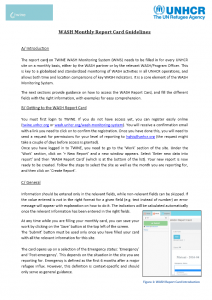
Ce document expliquent comment accéder à la fiche de rapport WASH et comment remplir les différents champs avec l’information adéquate, en donnant des exemples pour une meilleure compréhension.
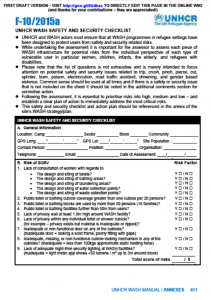
This document has been designed to help UNHCR and WASH actors assess potential WASH related safety and security issues related to trip, crush, pinch, pierce, cut, splinter, burn, poison, electrocution, road traffic accident, drowning, and gender based violence.
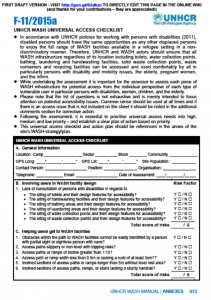
This document has been designed to help UNHCR and WASH actors assess WASH infrastructure for potential access from the individual perspective of each type of vulnerable user in particular persons with disabilities, women, children, and the elderly.
Tags: Accès pour Handicapés, Approvisionnement en Eau, Développement des Stratégies EHA, Douches, Évaluations EHA, Gestion de Programmes EHA, Installations pour la Lessive, Suivi et Evaluation EHA, Thèmes Transversaux, and Toilettes Communautaires. Languages: Anglais. Organisations: UNHCR. Categories: Directives Opérationnelles EHA, Documents de Référence EHA, Formulaires et Outils EHA, and Principes directeurs EHA.
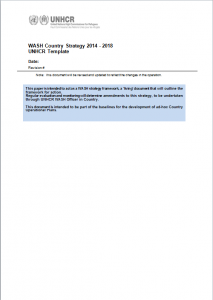
Where required, UNHCR and WASH actors should work together to develop a country level refugee WASH strategy document that clearly describes the refugee context, the baseline WASH situation, WASH coverage, WASH gaps, along with short (6 months), medium (6 months – 5 years) and long-term (>5 years) strategies for each of the WASH sub-sectors and the twelve (12) WASH principles. This template can be used to help produce the Country level WASH Strategy.
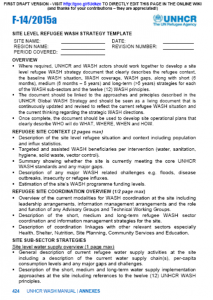
Where required, UNHCR and WASH actors should work together to develop a site level refugee WASH strategy document that clearly describes the refugee context, the baseline WASH situation, WASH coverage, WASH gaps, along with short (6 months), medium (6 months – 5 years) and long-term (>5 years) strategies for each of the WASH sub-sectors and the twelve (12) WASH principles. This template can be used to help produce the site level WASH Strategy.
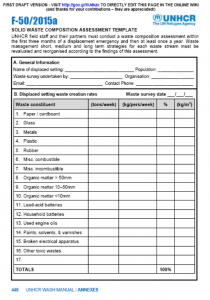
UNHCR field staff and their partners should conduct a waste composition assessment to assess the types of waste being produced and their and rates of production. Ideally the assessment should be carried out within the first three months of a displacement emergency and then at least once a year. Waste management short, medium and long term strategies for each waste stream should be revaluated and reorganised according to the findings of this assessment.
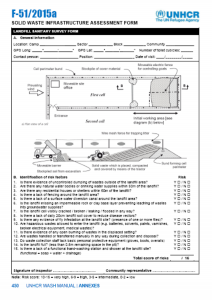
This form can be used to assess the refugee landfill site for public health and environmental sanitary risk factors.
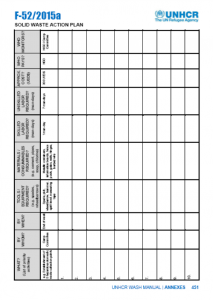
Where required, UNHCR and WASH actors may use this template to develop a solid waste management action plan that describes a list of prioritised solid waste management activities in addition to WHO, WHAT, WHERE, WHEN and HOW they will be carried out.
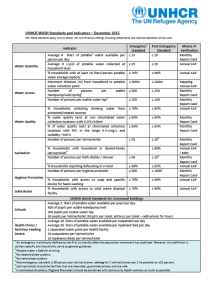
A summary of UNHCR water, excreta management, solid waste management, disease vector control and hygiene promotion standards and indicators for emergency and post emergency refugee settings including means of verification.
Tags: Approvisionnement en Eau, Contrôle et Suivi de la Qualité de l'Eau, Développement des Stratégies EHA, Douches, Écoulement des Eaux, Évaluations EHA, Gestion des Déchets Solides, Gestion des Excréta, Lavage des Mains au Savon, Lutte Antivectorielle, Sensibilisation à l'Hygiène, and Suivi et Evaluation EHA. Languages: Anglais. Organisations: UNHCR. Categories: Normes et Indicateurs EHA.
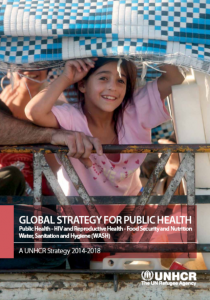
This document describes UNHCR’s global strategy for public health through a set of guiding principles and strategic approaches including protection; age, gender and diversity; equity; access; sustainability; community empowerment; appropriateness and reliability; partnerships and coordination; capacity building; communication and advocacy; integrated approaches; measurement and monitoring; and innovation. The document describes strategic objectives and enabling actions per sub-sector (Public Health, HIV and Reproductive Health, Food Security and Nutrition, and WASH).
Tags: Approvisionnement en Eau, Coordination EHA, Développement des Stratégies EHA, Droit à l'eau / assainissement, Genre, Gestion des Excréta, Lutte Antivectorielle, Optimisation des Ressources, Protection, Renforcement des Capacités, Santé Publique, Sensibilisation à l'Hygiène, Suivi et Evaluation EHA, and Violence Basée sur le Genre. Languages: Anglais. Organisations: UNHCR. Categories: Directives EHA, Directives Opérationnelles EHA, Documents de Référence EHA, and Principes directeurs EHA.
 Français
Français










